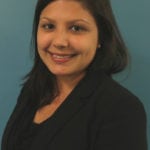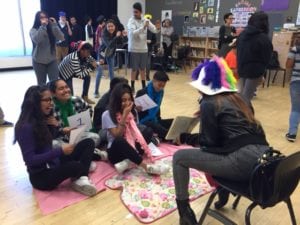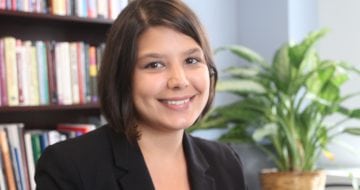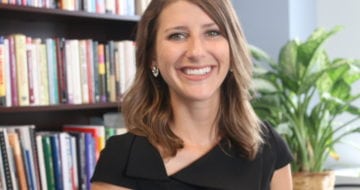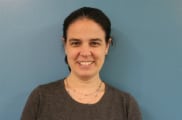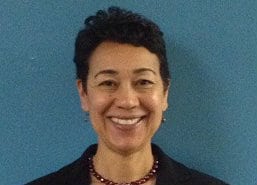Part of what it takes to ensure students are college and career ready is to provide students with hands-on, workplace learning opportunities to enrich their academic experience. Work-based learning opportunities are important for developing essential skills needed for the 21st century workforce, such as the ability to communicate effectively, think critically, problem solve, resolve conflict, work well with others, and the list goes on and on. Regardless of what you call them, these employer-desired skills are often cultivated outside of the classroom, therefore presenting an opportunity for schools and businesses to work together.
AYPF recently took teams of state education policy leaders on a study tour to Los Angeles, California to explore integrating deeper learning and career readiness. We visited two high schools focused on rigorous academic and workplace preparation to better prepare students for postsecondary success: Los Angeles High School of the Arts (LAHSA) and Da Vinci Science.
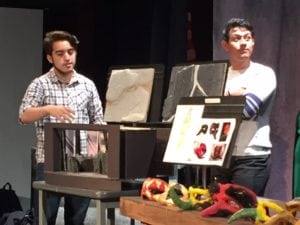
LAHSA students selected as the set designers for the Spring production of Hamlet describe their design and how it evolved.
LAHSA is a Linked Learning certified school within the Los Angeles Unified School District that offers career pathways in acting and theatre design. In addition to core academic classes, students take rigorous classes in acting, dance, and technical theatre, and each semester students complete a Linked Learning project that incorporates the skills and knowledge gained across various classes. The project culminates with a student-designed production; all costume, set, and lighting design, leading up to the actual student performance, is created by teams of students under the direction of certified career and technical education teachers with professional experience in arts and theatre. In addition, professionals of the performing arts community sit on the school’s “advisory board” and provide students with access to internships at their theatres, hold workshops on acting, and help evaluate senior defenses.
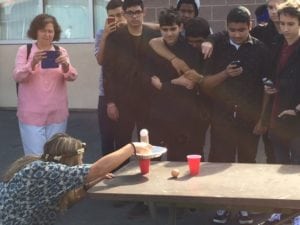
Monica Martinez,Hewlett Foundation Senior Fellow, and Da Vinci School students watch physics demonstration by 9th grade teacher Jamie Larson.
Da Vinci Science is a part of the Da Vinci Schools charter network and certified by Project Lead the Way. The school offers career pathways in engineering and biomedical sciences and provides students with a project-based, college preparatory curriculum. Students work in teams on projects that demonstrate mastery of content standards and skills, and progress is measured through public presentations of learning, exhibitions, and digital portfolios, as well as through traditional tests and quizzes. At Da Vinci, business partners provide “real world learning” experiences for students, such as internships and work experience for elective credit, and professional engineers co-teach physics courses at the school.
The engagement of the business community at both of these schools is quite robust. For example, at Da Vinci, close to 700 students have participated in the work experience elective since its inception with the help of more than 125 business partners. How do these schools pull it off?
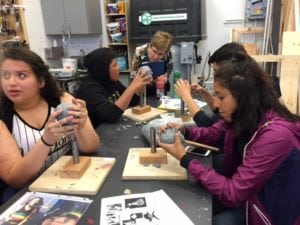
In the theatre design lab, Susan Huard, President, Manchester Community College, talks with students as they work on masks of different influential people from history.
David Rattray, Executive Vice President of Education and Workforce Development at the LA Chamber of Commerce and former business executive of SYSCO, provided some insights from his 20 years of experience working in the foodservice distribution industry. From the perspective of the business community, David stressed the importance of schools approaching businesses with opportunities of mutual self-interest. He continued that while schools likely stand to gain the most from the partnership, businesses must also gain something for their involvement. On one level, if education is a societal good, all win when a student’s educational experience is enriched. On another level, businesses might be more inclined to get involved if there’s a more direct return on investment. Perhaps the former is more noble, but the latter may be more realistic.
Business partners at both schools commented on how much they enjoy working with students and enriching their educational experience. Certainly these industry professionals value the relationship they have with the school and students and see the win for both them and the school. However, I also saw evidence of the “win-win” that David talked about.
At LAHSA, it was revealed that one partnership between the school and a local theatre company was born, at least in part, out of mutual self-interest. The school was looking for a business partner to join their advisory board and Cornerstone Theatre Company was in need of a school cafeteria for its Lunch Lady Courage production. For LAHSA, the win was student involvement in the production, including co-writing songs for the play (see video). Students gained professional theatre experience and were able to apply their learning at LAHSA to the real world. For Cornerstone, the win was access to a school and lunchroom.
At Da Vinci, Matthew Wunder, Founder and CEO declared that “we are in the aerospace capital of the world,” as they are surrounded by Boeing, Northrup Grumman, and other aerospace companies. These enterprises need more qualified people in the aerospace field and they are thus happy to invest locally in developing the pipeline of young talent. It was mentioned that engineers who volunteer at the school engage with students differently than teachers; the engineers are very direct and oftentimes will be clear when a student’s design or idea doesn’t make sense. For Da Vinci, the win is that students receive authentic mentorship by professional engineers and are exposed to the knowledge and norms of engineering circles. For engineers, the win is helping mentor the new generation of workers from the community.
These are some examples of how partnerships between schools and employers can have reciprocal gain. As schools look to businesses for their involvement, perhaps they should think more strategically about what’s in it for employers and how to help the business see the win-win for all involved.
Jenna Tomasello is a Policy Associate at the American Youth Policy Forum.



